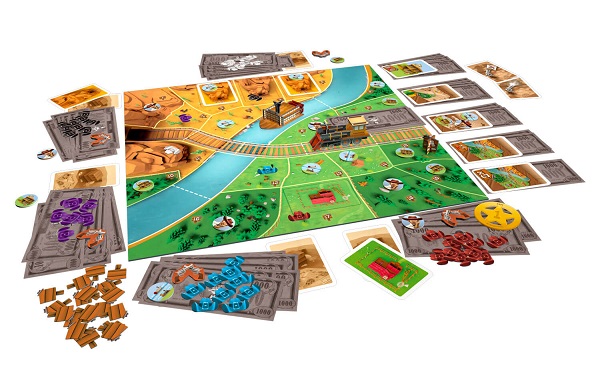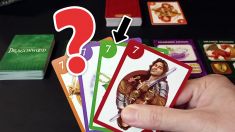Bid for Land, Complete Objectives, and Participate in the Occasional Duel in Pappy Winchester

Who will be the new head of the family? Bid on plots of land, mines, and the family ranch — the player with the most money at the end of the game will lead the family.
Pappy Winchester by Blue Orange Games is an auction game that is played over nineteen rounds. Players compete to fulfill shared and personal objectives, as they bid on land and divide their inheritance among themselves.
Gameplay
The board is set in the middle of the table. The boat token is placed on any of the four river spaces and the train is placed on any of the five train track spaces. There are three mine locations on the board; you shuffle the five mine cards and place one, face-down, on each mine location, and return the rest to the box. You do the same with the ranch location and the three ranch cards. You also place a bonus token, face-down, on each of the nineteen plots of land on the board (these include the mines and ranch). Next, you create five stacks of increasing number of banknotes (each banknote in the game is worth $1,000), and place a random shared objective card on each one.
Each player is then given eight banknotes to start the game, one duel token, and two secret objective cards. The game is played over a series of nineteen rounds, until each plot of land has been auctioned off.
At the start of each round, the start player draws a number token that corresponds to one of the plots of land. This is the plot that will be up for auction this round. Starting with the start player, players take turns bidding or passing. Once you have passed, you cannot bid again this round. You can also never bid more money than you have. Once every player but one has passed, the remaining player wins the land. Alternatively, when there are only two players left in the bidding, one of them can choose to discard their duel token in order to immediately end the bidding. The two duel cards are then shuffled, the two duelers each choose a card, and reveal them at the same time. The player with the winning card pays the last bid price and wins the property.
Whoever wins the plot takes the money he bid and distributes it evenly among all the other players. Any money that cannot be equally divided goes into the saloon. The winning player then takes one of his player tokens and puts it on the plot of land he just won; if the plot was the ranch or a mine, he always reveals the card and collects the money indicated on it. He also takes the bonus token off the plot, reveals it, and takes its action. Bonus token actions allow you to either move the train or boat (when either moves it awards each player who owns a plot adjacent to its new location $1,000), take the money from the saloon (this does not include any money placed there this round), or peek at any card (these include an opponent’s objective card, or a mine or ranch card on the board).
Finally, the winning player checks to see if he has completed any of the shared objective cards. These include things such as owning five plots of land, having one plot in each of the three terrain types, or three plots that are not adjacent to the railway. If he has completed a shared objective, he discards it and takes the pile of bills that had been underneath it.
The winning player will now be the first player for the next round of the game.
Once all nineteen plots have been auctioned off, the game ends. You check your secret objective cards, which award various bonuses such as $3,000 for each forest plot you own or each bonus token you gained that had you move the boat or train. You then total all the money you have, with a bonus going to the player with the most plots of land, and the player with the most money wins the game.

Review
Pappy Winchester is a well produced, family-friendly auction game. The board and components are bright and colorful, the rules simple and easy to teach, and the gameplay moves briskly.
Since the money is always moving around, and players who lose the bids are the ones who make money from the winner, you’re never out of the game simply because you spent too much of your money too quickly. There’s also a few additional ways extra money is added to players’ hands as they go, giving the game a little escalation and allowing bidding to get bigger and more intense as you play.
Pappy Winchester doesn’t bring anything all that new to the auction genre, but it takes the basics and blends them together into a really accessible and nicely designed game. The objective cards are well designed to keep players trying to figure out what plots are worth to themselves and their opponents, while the mine and ranch cards add a little bit of a push-your-luck element to those particular plots. Those cards might earn you a $5,000 bonus or they might be worth nothing! The shared objectives add even more competition to certain bidding wars — since these objectives and their values vary from game to game, they also add variety and replayability to the gameplay.
The bonus tokens add yet another layer to the gameplay as you try to weigh the odds of what they might be worth to you, particularly if you have a secret objective that requires them. We did wish that the rumor token, which allowed you to peek at cards, could also have been used to peek at tokens — because as you reach the end game looking at cards becomes less valuable — but in general we liked the abilities offered. The duel tokens are also a fun, thematic edition to the game that adds just a little bit of luck, mixed with some strategy for deciding when to use it.
Pappy Winchester is a well designed, streamlined auction game. No one ever is totally out of the running, the money moves around the table at a good pace, and the objective cards offer plenty of opportunities to plan and strategize. Not too complicated for families, it’s attractive and simple, yet engaging.
Pros: Family friendly, attractive components, objective cards keep the bidding mechanism fresh throughout the game
Cons: Doesn’t bring anything all that new to the auction genre (if you don't like auction games, this won't change your mind)
Disclosure: we received a complimentary review copy of this game.












